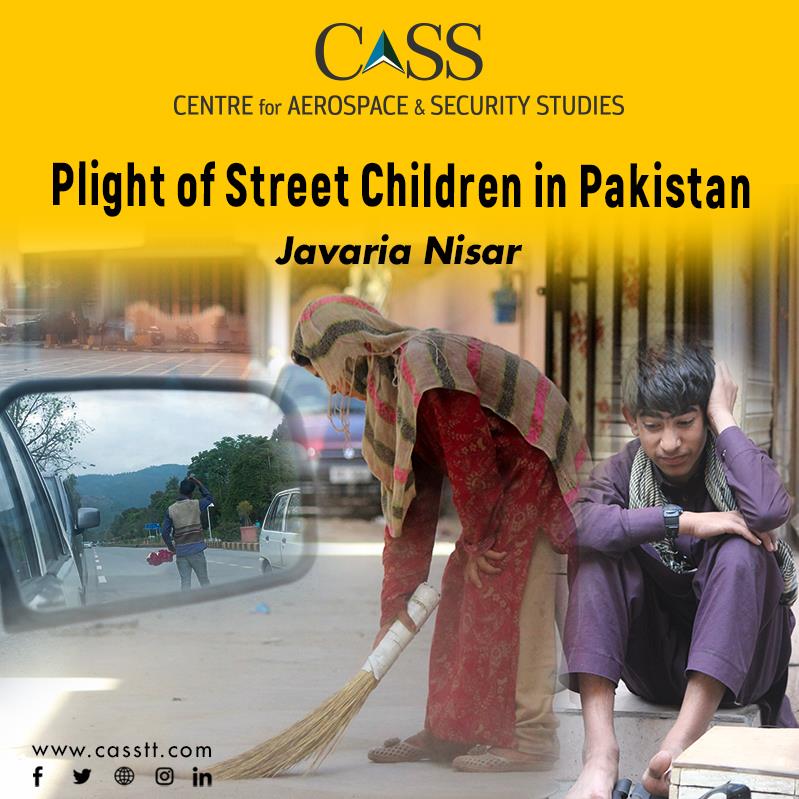‘Do you have water?’, he asked me with thirsty lips and tearful eyes. It was a hot and humid day. The little kid had been selling flowers on the main Margalla Road in Islamabad. He looked tired and worn out. His naked feet were burning. But, he did not have enough money in his pocket to quench his thirst or buy a pair of shoes.
The presence of the poor child, who seemed hardly seven or eight years old, was in stark contrast to the surroundings. The road was flanked by luxurious houses on one side and on the other, it led to the high-end restaurants in Saidpur Village. The little child was in between; poverty-stricken and unable to afford a bottle of water despite being surrounded by symbols of wealth and elitism.
Unfortunately, even in the capital city of Islamabad, the state cannot promise him basic food or a few drops of water.
Pakistan has been ranked 149th out of 185 countries in the KidsRights Index 2022 which measures the implementation of children’s rights globally. According to the National Commission on the Rights of Child (NCRC) statistics for the same year, there are more than 1.5 million street children in Pakistan. They have been condemned to live, work and beg on the streets in unsafe conditions.
Furthermore, these children are unable to afford a healthy and balanced diet. In fact, they live off whatever food they can find on the streets. Often, they can be seen in garbage dumps scavenging for food or items that they can sell. This makes them vulnerable to all kinds of health hazards that come with living on the streets. Moreover, several civil society reports provide evidence that these children can fall prey to sexual and drug abuse. A Federal Ombudsman Secretariat’s 2022 report also suggests that beggary rings often exploit street children by forcing them to beg and earn money for them.
Several factors force children onto the streets with extreme poverty being a major one. According to Save the Children 2022, more than 3.4 million children are facing chronic hunger in Pakistan. It is also estimated that nearly 40 percent of Pakistan’s population is facing food insecurity. These families also don’t have access to basic necessities such as education or healthcare, depriving them and their children of better opportunities and forcing them to turn to the streets as a means of survival. Rising inflation has forced more than 3.3 million children into child labour in search of means of subsistence, thus, entrapping them in a vicious cycle of deprivation, abuse and social neglect. Extremist narratives also find recruits from vulnerable children whose lives are scarred by pain and agony.
Moreover, it becomes difficult to achieve national cohesion when resources are not uniformly distributed across various communities. For example, the scale of food security in a country has a direct impact on its national security. Deprived segments of society will always agitate against the better positioned, rather better provisioned, leading to social unrest and communal violence.
In light of this, the government and society must take a holistic and multifaceted approach to effectively address this key issue. To begin with, governments (federal and provincial) should provide safeguarding mechanisms such as child protection services, shelters, and rehabilitation and reintegration programmes to these vulnerable and at-risk street children. This also aligns with the UN Convention on the Rights of the Child (UNCRC) Article 19 and Article 32 which are about the protection and safety of children. Pakistan, despite ratifying this Convention in 1990, has failed to establish a case management and referral system related to child protection in accordance with international standards. In this regard, assistance of the private sector and reputable NGOs can also be enlisted in order to augment government resources, and necessary administrative infrastructure for rehabilitation of street-connected children.
In addition, it goes without saying that the government needs to steer the country out of the current economic turmoil and burgeoning food crisis as soon as possible. Without economic progress, poverty eradication will remain a far-fetched dream. And without poverty eradication, the problem of street children cannot be resolved.
Finally, civil society must play its part in helping these vulnerable children. Every effort counts; from buying a bottle of water for the child selling flowers on the street to helping a child pay his/her school fees. Philanthropic organisations can help poor families and their children by donating food and providing them clothes/shoes etc. (especially on religious celebrations like Easter and Eid).
It is only through the collective and concerted efforts of society and state that the problem of street children can be dealt with successfully. Therefore, governments, the private sector, and civil society must join hands to save these children from being forced to live a life of destitution so that every child enjoys his/her rights with no exceptions. Let us act now.
Javaria Nisar is a Research Assistant at the Centre for Aerospace & Security Studies (CASS), Islamabad, Pakistan. She can be reached at cass.thinkers@casstt.com.
Image Credit: Hira Mumtaz




